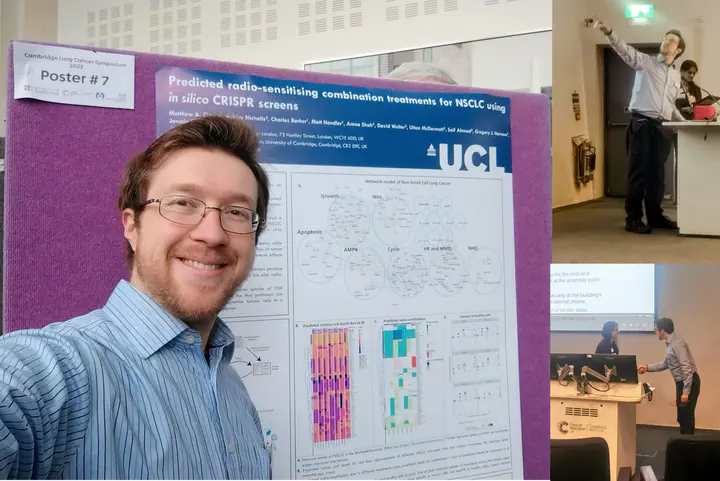Predicted radio-sensitising combination treatments for NSCLC using in-silico CRISPR screens
 I am incredibly grateful for the opportunity to present our research findings at the inaugural Cambridge Lung Cancer Symposium, and thrilled that our research poster won an award! It was great to have the opportunity to share the exciting work of the Fisher Lab on finding treatments to make non-small cell lung cancer more responsive to radiation therapy. I look forward to next year!
I am incredibly grateful for the opportunity to present our research findings at the inaugural Cambridge Lung Cancer Symposium, and thrilled that our research poster won an award! It was great to have the opportunity to share the exciting work of the Fisher Lab on finding treatments to make non-small cell lung cancer more responsive to radiation therapy. I look forward to next year!
Abstract
Lung cancer is the leading cause of cancer mortality world-wide, with over half of lung cancer patients relying on radiotherapy (RT). Tailoring RT to patient biology remains challenging, despite improved engineering methods allowing more precise RT targeting to patient anatomy. Combining RT with targeted drug therapies allows the personalisation of radiotherapy by radio-sensitising tumours, but requires better mechanistic understanding of how different mutational backgrounds drive treatment response. To predict the most effective radio-sensitising treatments combinations, tailored to different non-small cell lung cancer (NSCLC) mutational backgrounds, we have built an executable model of NSCLC signalling and used it to perform in silico CRISPR screens. This innovative computational approach predicts the effect of RT and drug combinations on tumour and healthy tissue and provides a mechanistic explanation of the differences in response between genetic backgrounds. We find that DNA-damage repair (DDR) inhibitors produce a broad effect across tumours but also radio-sensitise healthy cells. Conversely, we find that existing targeted therapies outside of DDR processes such as Wnt, Twist and the JAK/STAT pathways can be used to specifically radio-sensitise tumour cells in a patient-specific manner. Experimental validation of our in silico screens using novel in vitro RT-CRISPR screens further demonstrates the power of executable models to rapidly predict radio-sensitising targeted therapies for specific mutational backgrounds, paving the way for personalising treatment plans for improved patient outcomes.